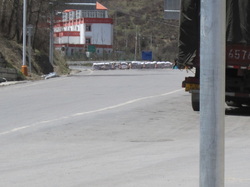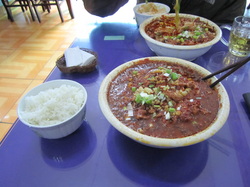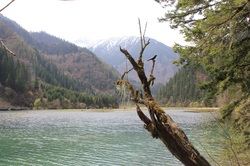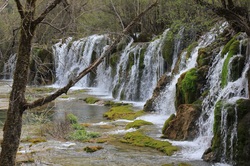China has issues. BIG issues with you-know-what-province. If you ever look into traveling to Tibet, a five-minute internet search would confirm that you cannot visit the province without the 24-hour accompaniment of a government-sanctioned guide. What you will not find on the internet are many travel details about the vast Tibetan region that pours over into Sichuan, Qinghai, and Gansu provinces, and it appears that these bordering regions are often the setting for some of the most heated conflict.
Almost two months ago a Tibetan monk from the Kirti Monastery in northern Sichuan killed himself through self-immolation to protest China’s policies toward Tibet (story here). The Chinese government responded by sending military forces to the entire region to (forcefully) calm any potential unrest and pre-empt any further monastic headlines by immediately imprisoning hundreds of monks in the region (more details here). In Songpan – itself a very Tibetan town just south of area in question – we heard reports coming from the north of dozens of monks being rounded up by the military. I’ve read other travel logs that joke about the fact that it’s easy to distinguish Tibetan territory simply by the number of police on the streets: a fact I now fully comprehend. Songpan’s main road was like a Fourth of July parade. And the few foreigners we met who had made it south through the region told stories of being awakened at their hotel and told, "the weather will not be nice, [they] should head for greener land.” Wow. Despite what you may read in the Business section, modernity has not yet arrived for this country. Or maybe they’ve leaped ahead and this is the George Orwellian post-modern state. Either way, it’s scary.
So for us, our time in Songpan felt a bit like being stranded on death row. We had heard the area north from Songpan to just south of Xining was closed to foreigners because of the recent events and had already worked out our backup plan before heading out to the first police checkpoint. Stubborn as we both are, we thought our good looks, feigned ignorance, and a little use of the force may get us through. Thirty kilometers north of Songpan there it was: sandbag rows across the road and militia in plastic chairs. “Ok, remember, we just want to go to Lanzhou.” We had conveniently selected the largest non-Tibetan city north of the mess. “Play dumb, be persistent, and whatever you do, don’t stop smiling.”
Immediately as we rolled up, everyone stood up hands waiving. Young guys, I decided to have a little fun with the situation. “Whohoaa! WHAT is the issue?” I said with a big smile. More hands. “No, no! Go back.” (You know it’s a bad start when they don’t even request your passport). We spent the first half-hour passing back and forth a cellphone translating our humorously ignorant inquiries and their universally negative responses. Chinese cars and trucks pulled up every minute, each one accordingly validated and let through. “So it’s dangerous for us… but not for them. Surely if we get in the car with one of them we will be safe then” (mostly communicated through hand gestures). “No, no, no.” We laid out our Chinese maps and drew up numerous work-arounds for them; each one must have struck through an even more questionable area as these were met with big laughs and more rigorous head-shakes. Four guards soon multiplied to nine, and they kindly brought in an English-speaker to dispel us.
As luck would have it, a bus with some of the Westerners leaving the region passed while we had our maps laid out. I saw them coming, and so I stood like Vanna White with my open-palm following the bus as it slowly crept out around the blockades. “Now they’ve got some explaining to do,” I thought. Well not really, but it was fun to imagine us in a fair argument. This incident led them to explain to us the logic: “Chuanzhusi to Langmusi… dangerous. Langmusi to Chuanzhusi… not dangerous.” “Oh! No problem!” I said, “we’ll just do the Langmusi to Chuanzhusi route in reverse.” Needless to say, the humor was lost in translation. Maps, cellphones, smiles, charm; everything to no avail. Ben and I both even scoured the hillsides for old truck routes, thinking if we just made it past this checkpoint we would be home-free (conveniently ignoring the fact there was probably another checkpoint 20 kilometers later).
By this point we had switched our goal to simply trying to get someone to truly admit why we weren’t being allowed to pass. They don’t want any reports of what is going on in the area to get out to the foreign press. Two hours later as the arguments waned, the translator hit us with the dagger, “it is my country,” she said, “please you must just respect our laws.” Ouch. It felt similar to when your parents tell you they’re disappointed; there’s just nothing against that. No matter how backward the rules may seem, she was right. It’s their world, and we’re just passing through. So it was on to plan B: the long retreat to Chengdu followed by a couple thousand kilometer train loop around “the dead zone.”
Our one minor victory in the ordeal, at the risk of losing my camera, I did manage to sneak back and snap a photo of the checkpoint. Just picture Jason Bourne in tight cycling shorts.
Per usual, we drowned any hint of disappointment we had with copious amounts of food. Sarah’s husband cooked us up a deliciously spicy “special Sichuan hotpot” for dinner. Tasty as it was, it was certainly special as I think it will soon be competing against the South Beach Diet. I lost five pounds in one night (Days Booting: Kellen – 1… to be fair, Ben already has 2). Chalk that one up to part of the experience.




 RSS Feed
RSS Feed